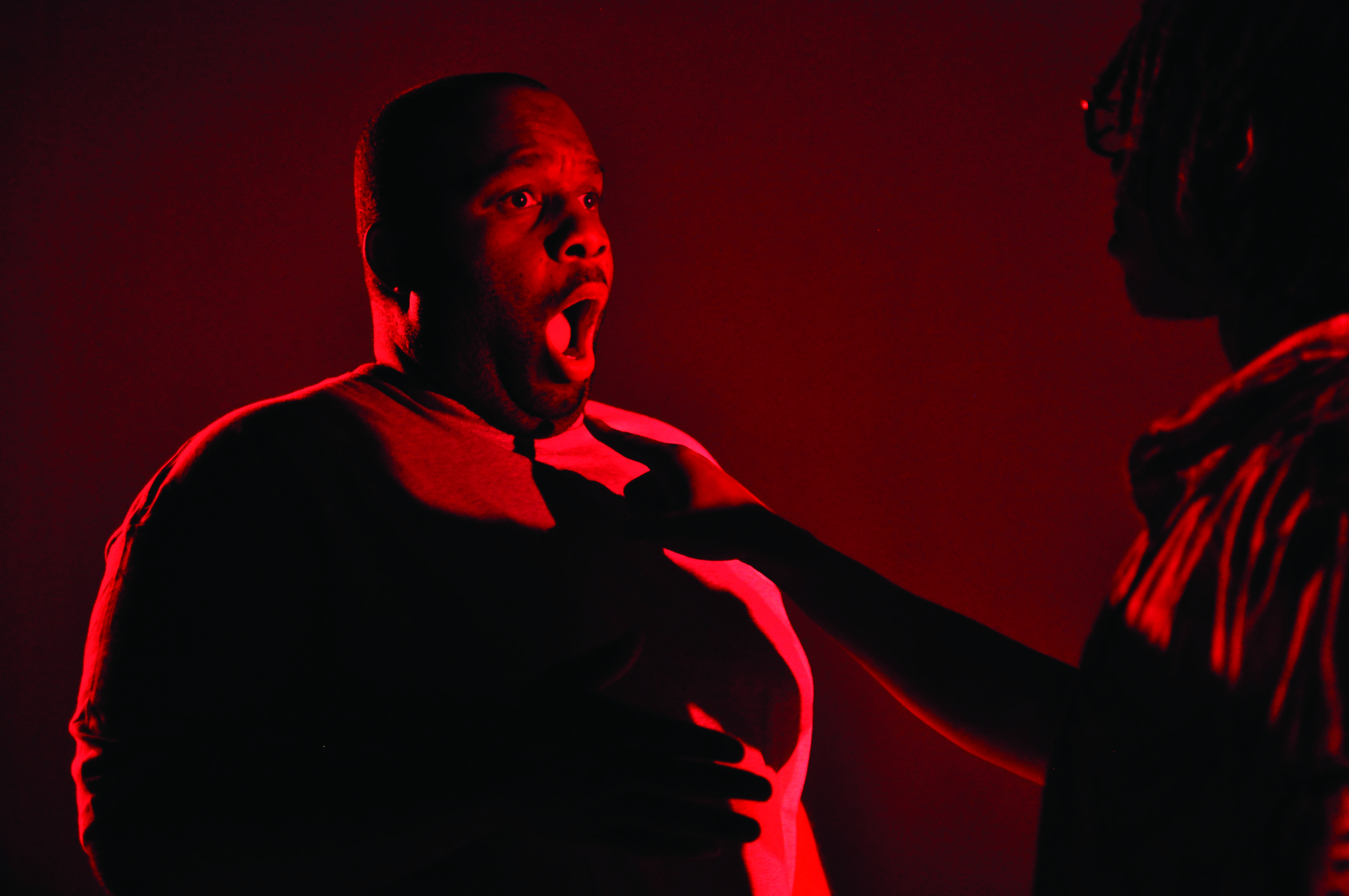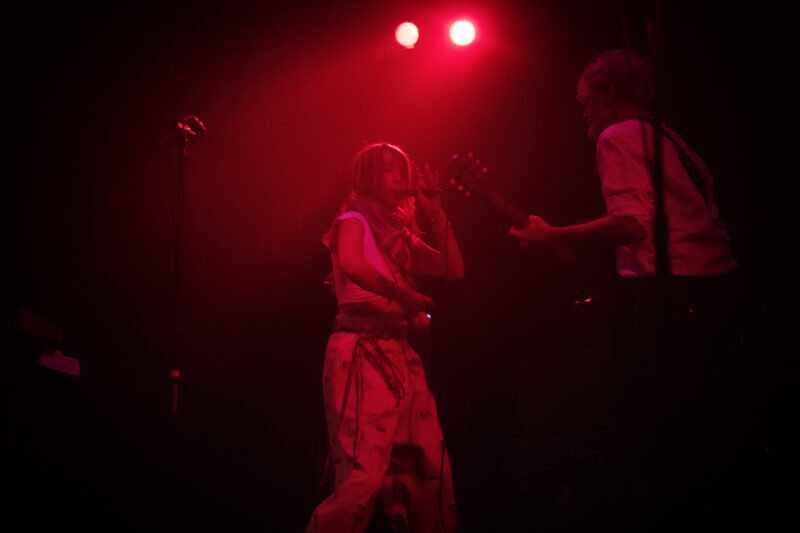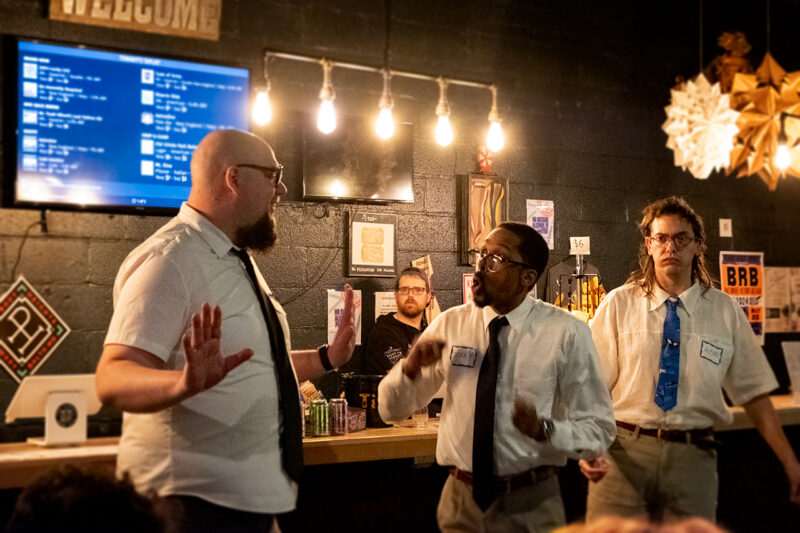Insurrection: Holding History Dares to Laugh at the Past
By Bret McCabe
“The American society has always feared rebellion from black folk. It is quite metaphysical, like the national conscience recognizes that something is wrong with the way we have been treated. Consequently, if whites could find someone to throw white paint on our black faces, to disfigure us, to distort our reality, to main our history, then they would feel more comfortable with us. Therefore, if a white writer, with black assistants, could blunt the edge of our rage, if he could problematize our heroes or add layers of complexity to our heroes’ motives, he could thwart our anger, eradicate our demands for justice, and eliminate the need for reparations. Why is it that Alexander Crummell, Marcus Garvey, Nat Turner, and Malcolm X have drawn such drastic postmodern attempts at redefinition? Is it not possible for an African person to be clear about anything, but particularly clear about racism in America?”
Excerpted from Dr. Molefi Kete Asante’s “The Real Nat Turner” (2009)
The most daring play in town right now is Baltimore Annex Theatre’s production of Robert O’Hara’s Insurrection: Holding History. It is the majority white local DIY-slash-experimental theater company’s first production with a majority African-American cast. Insurrection was young black writer/director O’Hara’s first play, which he staged as a 26-year-old first-time director at the Public Theater in 1996. In it a young, gay black graduate student in late 20th century America is transported back in time with his nearly 200-year-old great, great grandfather, who was a slave on the same Virginia plantation as Nat Turner just before Turner leads an ill-fated rebellion.
During this production you will see young black actors stripped down and prepared to be whipped. You will hear young black actors speak in the affected, idiomatic country grammar way too familiar thanks to the likes of popular entertainments such as Disney’s Song of the South.
You will see a young white actor call a young black actor the N-word, and every time it happens it is infinitely more uncomfortable than the 159 times it is said in Quentin Tarantino’s Reservoir Dogs, Pulp Fiction, Jackie Brown, and Django Unchained combined. But what director Kyle Jackson, who I think makes his Annex directorial debut with this production, does here that is so refreshingly gutsy is embrace O’Hara’s impudently satirical script with both arms. Insurrection is funnier than it has any sane right to be.
Annex’s Insurrection is an uncomfortable riot. Graduate student Ron (Nathan Steven Couser) is writing his dissertation about the Nat Turner rebellions, and he’s come home where his family is celebrating the birthday of his great, great grandfather T.J. (Dominic Gladden). It’s his 189th, and the miraculously alive old man slumps silently in a wheelchair. His aunt Gertha (S. Ann Johnson) and cousin Octavia (Rachel Reckling) trade witty—my first instinct here was to call their exchanges “sassy,” but typed it and recognized how the script coyly invites such stereotypical assumptions on first impressions because the play is going to show how racism is rooted in history’s representation(s); and am not sure how much better “witty” is—barbs about each other and pester Ron.
You suspect they know he’s gay but he hasn’t come out to his family yet. Ron is half paying attention and half distracted by his dissertation; he’s also able to “talk” to his great, great grandfather through the spirit Mutha Wit (Ama Brown), and T.J. knows and accepts who Ron his. In fact, T.J., speaking through the spirit, wants Ron to know that who he is can be a source of power. And T.J. is going to show him how.
And with that character interaction Insurrection begins its pop-culture swirling adventure and its thematic ambition to connect the past to the present. T.J. and Ron are transported back to the Virginia plantation where Nat Turner (Khalid Bilal) is trying to rouse a group of slaves—Izzy Mae (Terena McLorn), Katie Lynn (Reckling), Hammet (Kenyon Parson), Mutha (Brown), and the white indentured servant Buck Naked (Dave Iden)—to rise up against their master’s wife Mistress Mo’Tel (Johnson) and her enforcer Ovaseea Jones (Bilal). This long section of the play runs through a series of set pieces that blend any number of allusions—Roots, The Wizard of Oz, Gone With the Wind, the church sermon—into a whorl that doesn’t simply suggest that the past shapes the present as much as that they coexist, one haunting the other. The result is that the play pinball bounces from depiction of slavery’s horror to comic vignettes that are rooted in catching the inside-joke—and back again.
At times the juxtapositions are jarring. Mostly, though, they’re a showcase for the cast’s impressive on-the-fly shifts in mood and tone—Bilal, Johnson, and Reckling are revelations, each switching gears from scary serious to broadly comic with effortless ease. Set designer Andrea Crews turns Psychic Readings’ intimate performance space into a brightly-colored white box to handle the time and place shifts, largely achieved through Evan Mortiz’s lighting set ups and David Crandall’s projections, and sound designer Rjyan Kidwell’s music sympathetically matches the play’s topsy-turvy narrative and emotional moods.
A quick hat tip to playwright O’Hara: Tackling Nat Turner as a person, character, and historical actor in any way is a big ask. Turner’s “confession” exists, in the form of a statement “fully and voluntarily made to Thomas R. Gray, in the prison where he was confined, and acknowledged by him to be such when read before the Court of Southampton; with the certificate, under seal, of the Court convened at Jerusalem, November 5, 1831, for his trial.” (PDF).
American novelist William Styron used that document as the historical starting point for his Pulitzer-prize-winning novel The Confessions of Nat Turner in 1967, a book criticized and lauded in equal measure. Its publication spawned a collection of essays about the way white writers misrepresent Turner’s life and actions, initially called William Styron’s Nat Turner and re-issued as The Second Crucifixion of Nat Turner by Baltimore’s own Black Classics Press. Turner, who he was and what he means, is a constant reminder that history—the stories we tell ourselves about how we got to the place where we became who we think we are—is a never-ending struggle between monolithic powers at the top, nothing-to-lose revolutionaries at the bottom, and the huge mass of us motherfuckers in the comfortably uncomfortable American middle trying to figure out how to be allies while wearing the mass-produced clothing of entitlement.
To pull at any dangling narrative thread surrounding Turner isn’t merely to find a giant knot, it’s to risk being flattened as the entire complicated history of the American “experiment” rolls right over you. Given its 1990s origins its tempting to group Insurrection in with a work such as Suzan-Lori Parks’ The America Play, but O’Hara’s satirical blade feels sharpened more on the whetstone of the novels by Ishmael Reed, long one of America’s most slept-on brilliant minds. To say that Insurrection doesn’t reach the ribald political intelligence of Reed’s Flight to Canada (1978) isn’t a knock. Very, very, very few things do. But that Insurrection aspires to that level of critical engagement is refreshing. It wants to acknowledge how history continues to (mis)inform the present for the purposes of both understanding it in a scholarly way and mocking it with vulgar humor. Such an approach defangs conventional textbook histories of their presumed authority, the notion that things are the way they are now because that was the only way for them to turn out.
So mad kudos to director Jackson and his ability to bring out the anarchic levity that runs through Insurrection in this production. While the exact targets of the play’s satiric critique sometimes get muddled by the story’s somersaults, the discombobulating power of laughter cycles though it: people laugh to keep from crying, to keep from being swallowed by self-hatred, to keep from feeling helpless today by the insurmountable shadow of yesterday. This production ends in a melodramatic scene that literalizes the play’s title, a visual echo of an unoccupied wheelchair sitting on the empty stage when you enter. The play narratively clarifies who that wheelchair is for early only on; symbolically, its presence suggests that anybody who hasn’t sufficiently confronted the past is the person in need of assistance.
Insurrection: Holding History By Robert O’Hara
Presented by Baltimore Annex Theatre through October 25 at the Psychic Readings
Author Bret McCabe is a haphazard tweeter, epic-fail blogger, and a Baltimore-based arts and culture writer.
Photo Credit: Carly Bales








